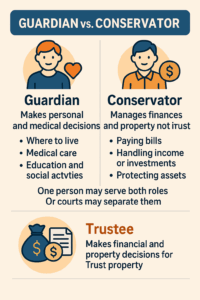Guardianship vs. Conservatorship in Arizona
When an adult can no longer make decisions or manage their own affairs, the court may appoint someone to help. In Arizona, that person may serve as a guardian, a conservator, or both—but these roles are different.
-
A guardian is responsible for making personal and healthcare decisions for an incapacitated adult, known as the ward. Guardians decide where the person lives, what medical care they receive, and how their day-to-day needs are met.
-
A conservator, on the other hand, manages the person’s financial affairs and property. The conservator may pay bills, handle investments, and protect the person’s assets from misuse or loss.
Sometimes, the same person serves in both roles, but the court may appoint different individuals depending on the circumstances. Both appointments require court oversight to ensure the protected person’s rights are respected and their needs are met.

How to Become a Guardian or Conservator in Arizona
Becoming a guardian or conservator involves several formal steps under Arizona law. The process begins when someone interested in the welfare of an adult (the proposed ward or protected person) files a verified petition with the Superior Court in the county where that person resides, is present, or owns property.
The petition must include detailed information about:
-
The petitioner,
-
The proposed ward or protected person,
-
The proposed guardian and/or conservator,
-
The reasons the appointment is needed,
-
The type of guardianship (general or limited, with or without authority for inpatient mental health care) or conservatorship (general, limited, or single transaction),
-
The proposed protected person’s assets, and
-
Other supporting information.
Medical or Professional Report Required
For a guardianship, the petitioner must submit a report prepared by a physician, psychologist, or registered nurse acting within their scope of practice. The report must describe the person’s diagnosis, functional impairments, ability to make and communicate decisions, medications, prognosis, and care recommendations, as required by A.R.S. § 14-5303. Additional information is needed if the guardian seeks authority for inpatient psychiatric placement.
Court Appointments and Hearings
The court will appoint:
-
An attorney to represent the proposed ward or protected person, and
-
A court investigator to meet with the ward and other interested parties.
Certain individuals have statutory priority to serve as guardian or conservator—for example, the person’s spouse, adult child, or someone nominated in a durable power of attorney or will.
The court then schedules a hearing. The petitioner must notify the proposed ward and other interested persons. At the hearing, the court hears testimony and reviews evidence to decide whether the appointment is necessary and appropriate.
If granted, the guardian or conservator must complete required training, file an acceptance of appointment, and in many cases post a bond. The appointee’s duties continue under court supervision and include budgeting, accounting, and periodic reporting.
Summary of the Steps to Be Appointed Guardian and/or Conservator
To summarize, the process includes:
-
File the petition with the Superior Court.
-
File the Affidavit of Proposed Appointee (notarized).
-
File the Acceptance of Appointment and Acknowledgment of the Court Order.
-
Complete and file the probate information cover sheet and other required documents.
-
Obtain and file the Health Professional’s Report (required for guardianships).
-
Complete training certifications for unlicensed fiduciaries and guardians, if applicable.
-
Obtain a hearing date and learn the name of the court-appointed attorney.
-
Serve notice of the hearing and all documents on the proposed ward and interested persons.
-
File proof of notice and affidavits of service.
-
Sign and lodge the form Order Appointing Guardian and/or Conservator.
-
Attend the hearing.
If any party objects, the case becomes contested, and the court may allow discovery and eventually hold an evidentiary hearing (trial) to resolve the issues.
Planning for Guardianship or Conservatorship of Minor Children in Your Will
Guardianship also arises in estate planning. Parents can name a guardian for their minor children in their wills to ensure that, if both parents pass away, a trusted person will care for their children. Without a named guardian, the court must decide who will assume this role—potentially leading to delays, family disagreements, or outcomes contrary to the parents’ wishes. It is vital to:
-
Choose someone you trust to provide appropriate care, and
-
Confirm that the person is willing and able to serve.
This designation gives parents peace of mind knowing that their children will be cared for according to their values and intentions.
What Happens If You Do Not Name a Guardian in Your Will?
If no guardian is named, the court must determine who will care for your children. Arizona law sets out an order of priority among relatives, but disputes or uncertainty may arise. Naming a guardian in your will helps avoid conflict and ensures that your children are cared for by someone you trust.
Contact Berk Law Group
If you have any questions about an Arizona guardianship or conservatorship or need assistance in an elder law matter, contact us or call 480.607.7900. We have broad experience dealing with a wide variety of probate and elder law matters in Arizona. To learn more about Arizona adult guardianships and conservatorships, you can read our guardianships/conservatorships article.
Schedule a Consultation Get Our eNewsletter

